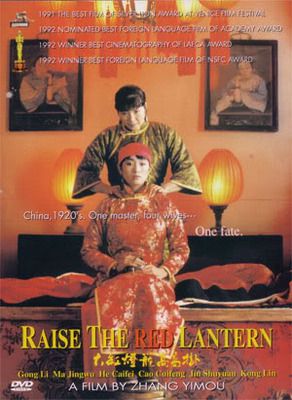
Raise the Red Lantern
1991
Director: Zhang Yimou
Starring: Gong Li, He Caifei, Cao Cuifen
Songlian (Gong Li) has no options left. Her father has died. Her stepmother cannot afford her college tuition anymore. At 19, she gives up her life to become the Fourth Mistress of a wealthy man and live at his estate, where the first, second, and third mistresses vie for power and control. Let the games begin.
Thus opens Raise the Red Lantern, perhaps the ultimate film about sorority life gone horribly, horribly wrong.
I have precious little patience for female squabbling. This stems from my years at college where I lived in a suite of girls all four years. During those years, I had anywhere from four to (god forbid) seven suitemates. Living in close quarters with other females for such an extended period of time had a bit of a traumatic effect on me. Perhaps the final straw was the screaming match my suitemates had, followed by days of silent treatment, over (I kid you not) cake frosting.
All of which is why I found the first hour Raise the Red Lantern terrifically unappealing. Watching the mistresses be bitchy and nasty to each other held absolutely no appeal for me. More than that, though, was the stereotypical treatment of the mistresses. When Songlian, young and pretty herself, meets the other women, it is clear that First Mistress is old and weary, Second Mistress (Cao Cuifen) is middle-aged but happy and kind, and Third Mistress (He Caifei) is also young, also pretty, incredibly jealous, and really really bitchy. So clearly, Third Mistress is the villain and Second Mistress is the sympathetic ear, and we get to watch all of the bitchiness through the lens of Songlian. Nothing really novel here.
I was not terribly impressed until the end of the first hour, when the characterization of these women turned from two-dimensional to “Holy cow, I didn’t see that coming!” Not being one to give anything away, I will comment that Zhang Yimou was brilliant in lulling me into a sense of complacency, thinking I had got a handle on the film, thinking that I understood what was coming next. I had absolutely no idea.

That’s really the great thing about the film. Although the characters begin as stereotypes, they grow and evolve far beyond their initial impressions. Most fascinating of all is easily Songlian. The opening shot of the film is her telling her stepmother that she has made the decision to become the concubine of a rich man. She does so with tears running down her face. She is backed into a wall, and is giving up her life. Sympathetic. She then arrives at her new house, and immediately gets drawn into bitchy power play with Third Mistress. Not so sympathetic. She then manages to turn into MegaBitch, faking a pregnancy in order to gain the ultimate control over the other mistresses. Rather evil and sneaky! But when things start to go wrong, she begins spiraling out of control, feels remorse, and ultimately, hers is a tragic story. Sad. Gong Li handles the role with aplomb, deftly showing a young woman who has, from the opening shot, given up on herself and on life.
The cinematography of the film is gorgeous. Once Songlian arrives at her new house, she never leaves it, just like the other mistresses. As the audience, neither do we. The film becomes entirely confined to the large household, thereby increasing the claustrophobia of Songlian’s world. What’s fascinating is the labyrinthine structure of the estate. Much of the film focuses on the main courtyard, off of which branches the four separate houses in which each of the four mistresses resides. Every night, the master of the house chooses who he will be spending the night with, and the four women wait in the courtyard to see who has won his favor. The courtyard, then, and the rooftops of the surrounding houses, are shot again and again and again as the power shifts from woman to woman.

Interesting, too, is the part of the master of the house. He is the one who wields the ultimate power and choice in the household, yet Zhang Yimou makes a very interesting choice in his character. He is photographed in the film, but always at a distance. There are no close-ups of the master. The closest we get to him is a shot of Songlian and him in bed together, but he is on the edge of the frame of a medium shot. Songlian is the focus. I have absolutely no idea what this man looks like. It’s a brilliant maneuver, making me tremendously aware of the fact of the existence of the master, yet making his actual identity unimportant. There is a man pulling all the strings, causing all this ruckus, but he is removed from the action of the film. Sad, really, that a man can make four otherwise normal, healthy women turn on each other, all over the sad trappings of power and dignity he dangles in front of them.
There is disagreement over whether this film was or wasn’t banned in China, or whether it is or is not a condemnation of the modern day Chinese culture and government. Zhang Yimou claims it is by no means meant to be a slight on Chinese culture or government, but it is difficult not to read it as such. The insular lives of the women and their struggles with each other can easily be seen symbolically, particularly that of Songlian, an innocent outsider who gets taken in by the established system and starts committing atrocities in order to fit into said system. You either learn the rules or get chewed up and spit out by the rules.
If nothing else, Raise the Red Lantern deserves praise for being a movie that got stuck in my head. I watched it a week ago, and I found myself thinking about it again and again. It seems slight at first, and I was completely ready to write the film off, but ultimately, there is great power and tragedy. It just takes awhile to get there.
Arbitrary Rating: 8/10
I loved your story about the frosting. It made me laugh. I don't know if this is true, or if it's one of those things that gets repeated so often it's just gotten accepted as true, but supposedly the Chinese symbol for "trouble" is two women under one roof. If it is true, it's fitting for this film.
ReplyDeleteFor what it's worth, I enjoyed the characterizations of the women, but I had the troublemaker pegged from the beginning. I tend to be a little cynical sometimes, and this was one of those times.
I believe this was the first Zhang film I saw, but it certainly wasn't the last.
The damn frosting episode was probably the thing that pushed me over the edge re: living with other females. I sat there incredulously watching my suitemates screaming at one another... over frosting... and then I hid in the suite of guys who lived across from us. Because guys are sane. Girls are crazy.
DeleteNope, I was not nearly clever enough to figure out the troublemaker in advance, so it came as a complete surprise to me.
I've seen other Zhang films, but I'm only now starting to appreciate his body of work. I've seen Red Sorghum and To Live, but I didn't realize these were all by the same director.
Just recently saw it on DVD. It is best to watch this uninformed as I did.
ReplyDeleteAlso refreshing (and surprising) that most critiques of the movie do not descended into male-bashing.
You have bad taste if you found the first hour terrifically unappealing. It was cinematography gold. There is no disagreement over whether or not it was banned. You just don't know how to research.
ReplyDeleteForget to mention. There is nothing labyrinthine about a Siheyuan. Do more research.
ReplyDeleteGet More Info useful site these details Dolabuy Prada check my reference official source
ReplyDeletevisit this website Ysl replica bags you could check here good quality replica bags Your Domain Name replica dolabuy
ReplyDelete